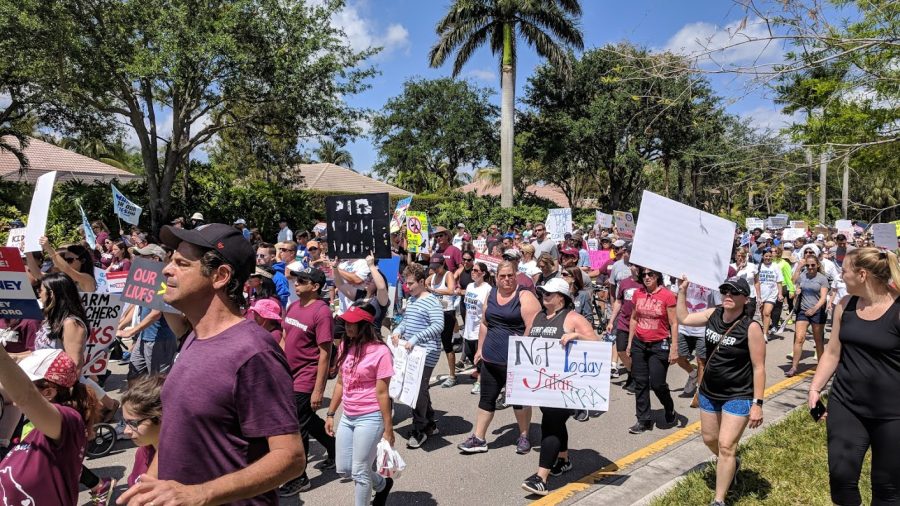A Reflection on Parkland, One Year Later
February 21, 2019
It’s been a year since the tragic Parkland school shooting, in which Nikolas Cruz killed 17 students and staff members at Marjory Stoneman Douglas High School.
After the shooting, passionate students rallied together to address the issue of gun violence in America. With help of the mainstream media, the student activists dubbed the “Parkland kids” immediately pointed their fingers towards Republicans and the NRA as the ones responsible for their suffering.
While I sympathize with the Parkland students, and fully support their right to rally and speak their minds, I disagree with their assessment of the shooting. The failure to prevent Cruz’s rampage wasn’t because of guns or the NRA, but due to the negligence of law enforcement and school discipline laws.
A Sea of Red Flags
Nikolas Cruz wasn’t just a student who snapped out of the blue, he had a long history of violent and disturbing behavior. According to the Washington Post, he was transferred between schools six times after threatening other students. He was also reported by students to joke about carrying out a shooting, and many students felt that he was a school shooter in the making.
Cruz’s murderous intent was further evidenced by his social media presence. He posted pictures of himself with weapons, and often made racist, sexist, and homophobic threats. He also commented “Im [sic] going to be a professional school shooter” on a YouTube video, leading the video’s creator to report him to the FBI, who failed to track him down.
The FBI also received a tip via their public access line describing his disturbing social media content and his desire to kill others about a month before the shooting. The agency neglected to forward the information to their Miami Field Office, causing the warning to go unheeded.
Local police weren’t in the dark about Cruz either. According to public records obtained by CNN, 45 calls were made to the police about Cruz from 2008 to 2017, two of which were anonymous tips about concerns of Cruz becoming a school shooter.
The number of red flags Nikolas Cruz put up is staggering, and yet despite a long history of violence and mental health problems, he was able to slip through cracks thanks to a school discipline program called PROMISE.
PROMISE and Reconciliatory Justice
Prior to 2013, Florida’s Broward County (where Stoneman Douglas is located) had one of the highest in-school arrest rates in the state. In order to fight what has been called the “school-to-prison pipeline,” the sheriff’s office and school board collaborated to reduce the number of arrests by allowing more incidents to go unreported, even ones like drug possession and assault.
This program was called PROMISE. When it was implemented, the arrest rate lowered dramatically, causing it to be celebrated by the Obama administration as a national model; the district superintendent was invited to the White House to celebrate the change in school climate, and the county received $54 million in grant money.
The problem was that PROMISE did little to actually reduce school violence and crime, and only reduced the number arrests. Troubled students weren’t referred to law enforcement despite committing arrestable offenses. The school instead tried to get them therapy or counseling, meaning their actions went unreported and off the record.
So what’s the significance of PROMISE on the Parkland Shooting? Well, for starters, if Cruz had been reported to law enforcement, he likely would have failed the background check he took to purchase his firearm. An arrest record would have also help the FBI when they investigated their tips, and it could’ve given them a reason to intervene.
A Poisoned Debate
The Parkland shooting has galvanized the gun-control movement, as well as student activists across the country. Parkland students David Hogg and Emma Gonzalez gained widespread national coverage, being featured on the likes of CNN and Trevor Noah’s Daily Show. They also helped created the March for Our Lives movement to protest gun violence.
But have they done anything to reach across the divides and solve the issue of gun violence once and for all? I’d argue that the media, via the Parkland kids, have only made the gun debate worse.
Hogg has been particularly toxic towards supporters of the Second Amendment; last year, he continually referred to supporters of the NRA as child murderers. His rhetoric, and the rhetoric of his movement, doesn’t do anything but worsen political polarization.
We should absolutely work together as a nation to stop tragedies like Parkland from happening again. However, this can not be at the cost of our ever diminishing liberty.[/pullquote]Some claim that we have done nothing as a country to solve gun violence. The Miami Herald recently published an article with the names of 1,517 children who were killed by guns, for example. As tragic as these incidents are, the methods proposed by the gun control lobby will do nothing to solve these issues.
It’s worth noting that actual assault weapons have been banned since 1986 due to the Firearm Owners Protection Act; the so called “assault weapons” that are now legal after the expiration of the Federal Assault Weapons are simply civilian semi-automatics with modern attachments (like telescoping stocks or barrel shrouds). The push to ban these types of weapons isn’t going to stop mass shootings, but rather to make steps towards citizen disarmament. After all, a disarmed populace that depends solely on the government for their safety is an easily controlled one.
The truth is, the right to bear arms is an unalienable one, and one of the most important pillars of American freedom. Gun ownership isn’t solely for hunting and self defense; it enables citizens to serve in the militia to protect from foreign invasion, or to resist the government should it turn tyrannical.
We should absolutely work together as a nation to stop tragedies like Parkland from happening again. However, this can not be at the cost of our ever diminishing liberty.







